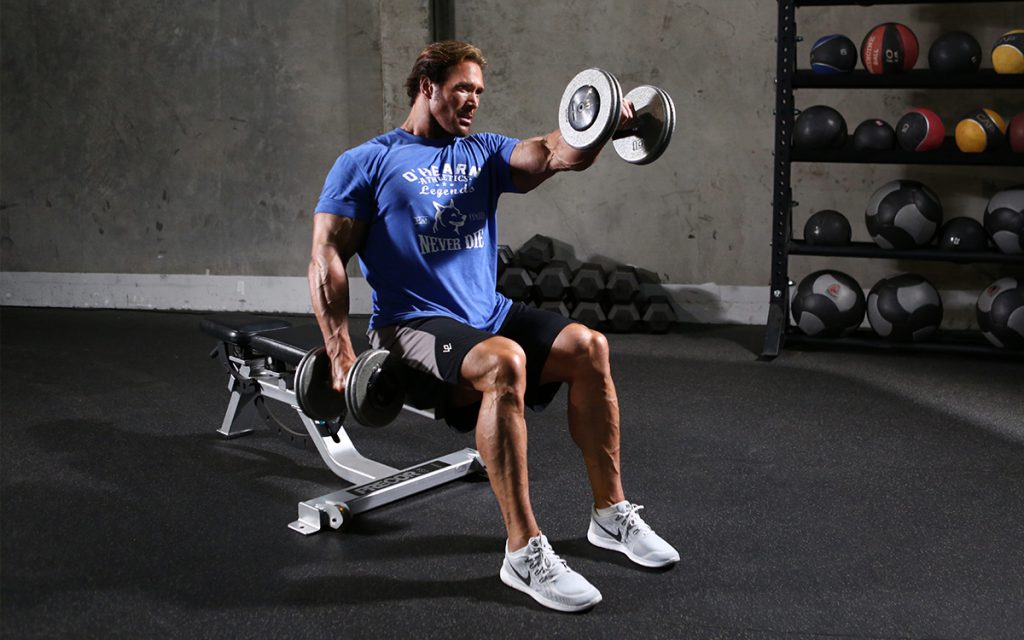There are many ways to train the body. You can train for strength. You can train for size. You can train for speed or mobility. But however you train, you’ll need to choose the appropriate types of exercises that best fit your desired adaptation. Both bodyweight exercises and resistance, i.e. free weights, offer pros and cons to their respective training style.

Pros of Bodyweight Exercises
Also referred to as calisthenics, a bodyweight exercise is any exercise whose only resistance is from the weight of the body.
Bodyweight exercises do not use barbells, dumbbells, or any machine to train the body. The idea of bodyweight exercises is to move your body through space with no restrictions. Examples include pushups, pull-ups, and lunges, all of which require no specialty equipment and can be done anywhere.
Try this bodyweight exercise: The Jump Squat Toe Tap.
Bodyweight exercises are better at improving functional movement patterns like the ones we use in everyday life —at least in an ideal life, since most of our lives now include driving to work and sitting all day, then driving home and watching Netflix all night.
So if you are training for something like a Tough Mudder or Spartan Race, you should include bodyweight exercises in your training.
Bodyweight exercises are typically safer, as they put less stress on the body. However, I would not recommend trying to walk on your hands your first day of training.
Cons of Bodyweight Exercises
One of the biggest cons of bodyweight training is the limited ability to overload, or make an exercise harder. Take for example the pushup: to make a pushup harder you have to do things like elevate your feet or do other variations like single-arm pushups to increase training intensity.
This is a lot more complex than just grabbing a heavier dumbbell. When you cannot easily overload the body, it makes it significantly more difficult to get stronger and grow muscle.
The most functional bodyweight exercises are compound movements, which target many different muscle groups. While that’s not technically a con, if you want to target a weak point of your body, isolation work makes more sense. And isolation work is tough to accomplish with bodyweight alone.

Pros of Resistance Training
Resistance training is any exercise that adds external load to the body through some sort of mechanical process. Unlike bodyweight exercises that involve your body moving through space, for the most part, resistance exercises require being still while you move weight around your body.
The biggest benefit of resistance/weights is their ability to progressively overload. By this I mean, if you want to make an exercise harder, just add more weight. If your goal is to get strong then the answer is easy: just lift more weight every time you lift.
Try this resistance exercise: The Weighted Lift-Up
Similarly, if you want to increase muscle, you must increase training volume, which is sets x reps x weight, the third part of which is easily done by sliding a 2.5 lbs plate on each side of the bar.
Another advantage of free weights is the ability to target specific muscle groups like chest, legs, arms, etc. If you want to grow your biceps, simply start curling a pair of dumbbells. If you were only doing calisthenic training, you’d have to do a bunch more pull-ups to grow your guns. Yet, this is not optimal since the bicep is only used in an auxiliary role, and is not being trained to its fullest potential.
Cons of Resistance Training
Unlike most bodyweight exercises, resistance training requires you to either buy expensive gym equipment or subscribe to a gym membership. So when comparing the financial incentive of choosing bodyweight vs resistance, bodyweight will win every time.
Lifting heavy loads also takes its toll on the body. Heavy loads will cause stress to not only the muscles, but the tendons, joints, and ligaments as well. For this reason, if you don’t know what you are doing, or you are not listening to your body’s warning signs, using weights can cause you physical harm.


